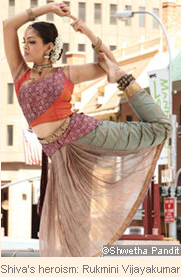
| Invitation |
| About the Festival |
| Performer Bios |
| Special Showcase |
| Workshops |
| Press Release |
| Reviews |
| Call for Submission |
| Downtown Dance Festival |
| Reviews |
| Source: Financial Times Erasing Borders Festival of Indian Dance, One New York Plaza, New York By Apollinaire Scherr |
The impressively wide-ranging concert a few blocks from Wall Street opened, appropriately, with a serene invocation to Ganesha, the elephant god of good fortune. Working in Mohiniyattam, a rare dance export from the fecund southern state of Kerala, soloist Mandakini Trivedi began by touching her palms in leisurely prayer as she held a long plié. Later, she rocked to and fro in a waltz rhythm and undulated an arm before her like an elephant trunk. Also curvy and soft were Rinku Bhattacharya-Das and Maitri Acharya as the lovers Krishna and Radha, the most prominent deities in Manipuri – another dance dialect, this time from the Burmese border, that does not travel much. The duet was both folksy and decorous. The two elaborately attired women – Acharya as Radha wore a mirror-encrusted hoop skirt – kept their feet close, their arms haloing their hips, and the floor patterns modestly a-swirl. As in east Asian court dance, the aim was harmony, not thrills. To quicken our pulses, Lakshmi Sriraman and Aniruddhan Vasudevan presented a storyless piece in Bharatanatyam style, renowned for its vast rhythmic lexicon. Staccato beats emanated from everywhere: from darting glances, belled heels, sharply bent knees, and arms flung to the horizon, then crossed at the chest, where the fingers flared like a bouquet. As for Bharatanatyam’s dramatic powers, Rukmini Vijayakumar recounted in a single epic stream Shiva’s many heroic deeds. Precise pantomime and especially her expressive face telegraphed that she was the exultant destroyer, then the fierce protector. Most lovely was the spirit at rest – standing leg and free leg bent while the arms draped upwards and the wrists drooped like heavy flowers on delicate stems. Deftly shifting between avatars, Vijayakumar seemed to mirror in miniature the Hindu faith. The afternoon’s forays into modern dance were more mundane. The dancers’ arms, face and timing may have gained from their mastery of Indian dance, but they offered only commonplaces. They said, “I miss you”, not “His trunk is like a lotus flower”. |
| Source: http://www.ft.com/intl/cms/s/2/15496b90-ccdd-11e0-88fe-00144feabdc0.html#axzz1Vs9R4aiC |
 Dance festivals in India often take place outdoors – maybe even in the shadow of skyscrapers, as did this mini-festival within the larger Downtown Dance Festival at Manhattan’s tip.
Dance festivals in India often take place outdoors – maybe even in the shadow of skyscrapers, as did this mini-festival within the larger Downtown Dance Festival at Manhattan’s tip.